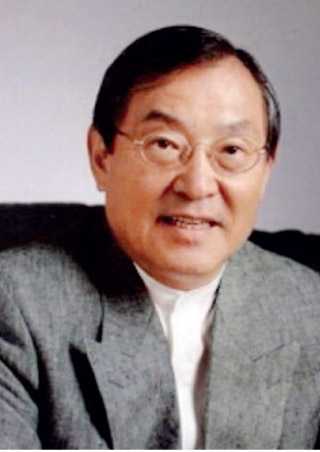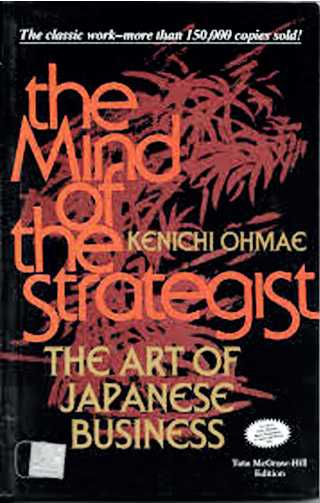Monday Feb 23, 2026
Monday Feb 23, 2026
Monday, 19 October 2020 00:20 - - {{hitsCtrl.values.hits}}
 |
| Kenichi Ohmae |
 |
| ‘Mind of the Strategist’
|
Whilst the COVID-19 pandemic continues to create panic, life must move on safely and serenely. I revisited one of my favourite authors on strategy, Kenichi Ohmae. His masterpiece and repeated bestselling book with a fitting title, ‘Mind of the Strategist’ inspired me again. I saw much relevance in what he discussed with the dire reality of COVID19. Let us deliberate further.
Overview
“Strategic success cannot be reduced to a formula, nor can anyone become a strategic thinker merely by reading a book,” so said Kenichi Ohmae, who is not a stranger to strategy. Still being brilliant at the age of 73, he is often sought out as a public speaker and management consultant.
As an acclaimed author he has published over 230 books, many of which are devoted to business and socio-political analyses. As his website reveals, he has also contributed numerous articles to major publications such as Wall Street Journal and Harvard Business Review. ‘The Mind of Strategist,’ ‘Triad Power,’ ‘Beyond National Borders,’ ‘The Borderless World’ and ‘The End of the Nation State’ are some of his seminal contributions.
The ‘Mind of the Strategist’ was first published in 1975 in Japan. Despite the continuing changes local, regional, and global alkie, its central message still remains valid and valued. Analysis is the critical starting point of the ‘Mind of the Strategist’. It is not hearsay that you should use for rushed decisions with ad hoc planning. Comprehensive analysis with clarity and coherence is the crucial need. It is much relevant with continuing with COVID19 as well.
Analysis is a cognitive process of breaking a complex puzzle into smaller parts to gain a better understanding of it. It essentially means separating a situation into parts and examining the parts in an attempt to understand what is occurring. In business scenarios, analysis involves identifying business needs related to a situation, identifying critical issues, and determining possible solutions.
As Kenichi emphasises, analysis is the critical starting point of strategic thinking. Manager's need intellectual flexibility and creativity to devise realistic responses to changing situations. In doing so, they need to ask the right questions in a solution-oriented manner and conduct appropriate analyses to formulate the needed game plan. As he further reiterates, “the object of strategy is to bring about the conditions most favourable to one's own side in helping one’s organisation to succeed in its purpose."
 “The strategist’s method is very simply to challenge the prevailing assumptions with a single question: Why?” observes Ohmae. In fact, the popular and proven Japanese techniques such as ‘Five Why Method’ highlights the significance of this.
“The strategist’s method is very simply to challenge the prevailing assumptions with a single question: Why?” observes Ohmae. In fact, the popular and proven Japanese techniques such as ‘Five Why Method’ highlights the significance of this.
“It is hard to let old beliefs go. They are familiar. We are comfortable with them and have spent years building systems and developing habits that depend on them,” he further states, emphasising the need to refer to “why” more often. “Like a man who has worn eyeglasses so long that he forgets he has them on, we forget that the world looks to us the way it does because we have become used to seeing it that way through a particular set of lenses.”
Three Cs as the core
Kenichi argued that the fundamentally strategic thinking revolves around three Cs: Corporation, Customers and Competitors. “Faced with problems, trends, events, or situations that appear to constitute a harmonious whole or come packaged as a whole by common sense of the day, the strategic thinker dissects them into their constituent parts. Then, having discovered the significance of these constituents, he/she reassembles them in a way calculated to maximise his/her advantage.”
Sadly, we forget these fundamentals and fall into pitfalls in so called strategic planning without proper strategy. It reminds me of what Henry Mintzberg said, drawing a parallel from John Godfrey Saxe who wrote a poem on ‘Six blind men and an elephant’.
“We are the blind people and strategy formation is our elephant,” says Mintzberg. “One has grabbed hold of some part or other and ‘railed on in utter ignorance’ about the rest. We certainly do not get an elephant by adding up its parts. An elephant is more than that. Yet to comprehend the whole we also need to understand the parts.”
It is obvious that being strategic is of utmost importance in the business context. It essentially shows how ‘smart’ you are in ‘playing the game’. The roots are from the Greek word strategios, which means the art of the general. Obviously, it has a military connotation. How a general orders the troops to attack, or to withdraw or to surround the enemy, with the aim of winning the war in mind. A battlefront and a business front have a lot in common, particularly with the sky-rocketing competition, globally as well as locally.
"In business as on the battlefield, the object of strategy is to bring about the conditions most favourable to one's own side, judging precisely the right moment to attack or withdraw and always assessing the limits of compromise correctly,” so said Kenichi Ohmae. “Besides the habit of analysis, what marks the mind of the strategist is an intellectual elasticity or flexibility that enables him to come up with realistic responses to changing situations, not simply to discriminate with great precision among different shades of grey.”
It is essentially to discover, design and deliver with regards to the interplay between corporation/company, customers and competitors. "A fascinating window into the mind of one of Japan's premier strategists,” said Michael E. Porter, strategy stalwart from Harvard in admiring Ohmae.
The purpose of strategy is to maximise one's advantage. On a battlefield, this means picking the right place to fight, the right time to attack, the right time to retreat, weighing and re-assessing as circumstances change, but always with gaining maximum advantage in mind.
Salience of strategic thinking
As Kenichi Ohmae advocates, “Strategic thinking involves trying to anticipate what might, will or could occur in a situation and how it is possible to shape or influence what is occurring so that what one wants to occur actually occurs.”
In fact, strategic thinking involves both thinking about consequences and choosing actions to achieve objectives. Such an endeavour also involves trying to turn a situation to one's advantage. It further involves asking the right questions in a solution-oriented manner and conducting appropriate analyses to formulate the required “game plan”. This is inclusive of anticipating competitor actions and preparing to counter or thwart them. Essentially, it revolves around holistic thinking with company, customers and competitors in mind.
Strategies are not purely deliberate. “Theorists … agree that intended, emergent, and realised strategies may differ from one another,” observes Mintzberg, in a similar line with Ohmae. This is very relevant to Sri Lanka where the strategies deliberated prior to the prevalence of COVID19 must be revisited.
Same was the case last year where the Easter Sunday attacks were a damaging disruption. It reminds us the often neglect fact that change is the only permanent reality. Whether we will be having a ‘V’ turn of economic recovery as some anticipated in handling COVID 19 with right set of emergent strategies remains to be seen.
“Rowing harder doesn’t help if the boat is headed in the wrong direction,” observes Ohmae. It is applicable to institutions and nations alike. In his much-acclaimed book, ‘Mind of the Strategist,’ there is much evidence to support the cause of an analytical approach towards crafting strategies. It brings to life the dynamic nature of strategy with its associated subtlety and variety. It is an invitation to explore the extent to which Japanese organisations have excelled with proper crafting and executing of strategies.
Paradoxically, strategy is both analytical as well as intuitive. Intuition refers to the ability to understand something instinctively, without the need for conscious reasoning. It is a common fact that entrepreneurs are more driven by “gut instinct” in pursuing their aspirations.
“The best possible solutions come only from a combination of a rational analysis based on the nature of things, and imaginative reintegration of all the different items into a new pattern, using non-linear brain power,” opines Ohmae, highlighting the interplay needed between intuition and information.
Interestingly, Kenichi Ohmae demonstrated this subtle synergy between simultaneously being analytical and intuitive in his unique lifestyle playing multiple roles. He has been a gifted flautist, nuclear physicist, prolific author, political activist, McKinsey consultant and after all a thought leader of true calibre. Such a multi-disciplinary approach ensures holistic, humane and humble way of demonstrating the ‘mind of the strategist’.
This is very much in line with a series of articles in the Forbes magazine recently in describing the needed leadership in the post-COVID19 pandemic. “In Japan, organisations and people in the organisation are synonymous,” observes Ohmae, supporting the required notion of people-centric leadership for strategy execution.
One good result COVID-19 brought about in the business circles is the challenge for the leaders to be humane. It has been a painful realisation of the value of humans and to achieve humane results. Despite the harsh treatment of some naïve administrators, most of the sensible leaders have realised the need to become humane.
Way forward
The ‘locking down’ experience was an invitation for us to be ‘looking up’ in understanding the ways of recovering with revival in many fronts. The resurgence of COVID-19 with the infected numbers suddenly shooting was a realisation of the grim reality of the needed continuation and cohabitation with COVID-19.
Crafting and executing strategies in both private and public sectors alike cannot escape the gravity of such a context. As Kenichi Ohmae told us, developing a ‘mind of the strategist’ with an analytical approach will ensure survival and success amidst COVID-19.
(Prof. Ajantha S. Dharmasiri can be reached through [email protected], [email protected] or www.ajanthadharmasiri.info)